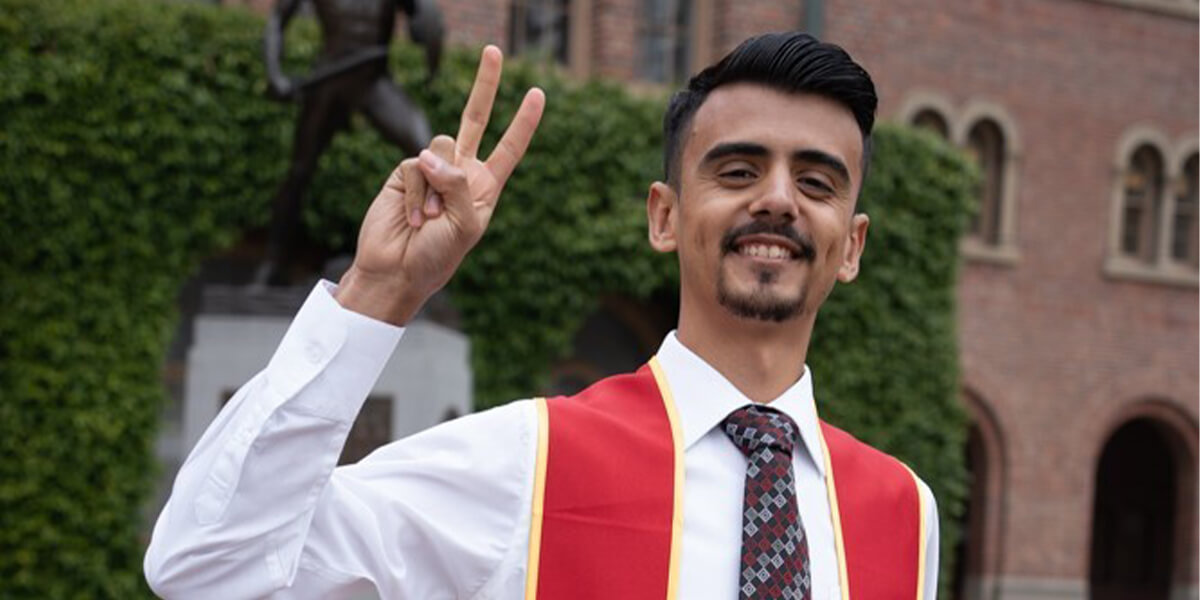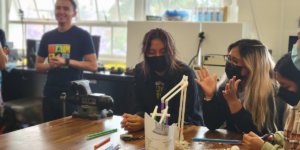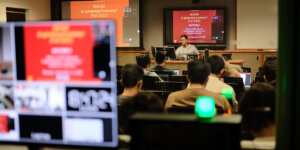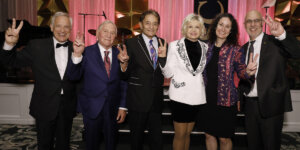
Electrical and computer engineering major Nomar Rodriguez devoted countless hours to supporting his USC Viterbi peers in the Society of Hispanic Professional Engineers (SHPE).
When graduating senior Nomar Rodriguez was in high school, he didn’t think he was the type to become a leader of community-oriented peer groups. “I wasn’t a very outgoing person,” said Rodriguez, who enjoyed participating in the robotics club and playing video games but shied away from activities like student council.
Now, Rodriguez, an electrical and computer engineering major in the Ming Hsieh Department of Electrical and Computer Engineering, is being recognized for his community-driven leadership. He’s the 2023 recipient of the USC Viterbi School of Engineering Community Impact Award, which recognizes the student who has provided the highest quality service to the Viterbi School and gone above and beyond their area of responsibility within a student organization.
Rodriguez, who is Mexican American, has made extraordinary contributions to USC’s chapter of the Society of Hispanic Professional Engineers (SHPE), a national organization dedicated to empowering the Hispanic community to realize its fullest potential in science, technology, engineering and math (STEM) fields. Only 6 percent of scientists and engineers in the U.S. are Hispanic, according to the National Science Foundation, even though Hispanics comprise 16 percent of the American workforce.
A first-generation college student, Rodriguez joined SHPE as a freshman. His SHPE peers helped him find his footing as he struggled with the transition to college. Wanting to pay that support forward to other members, he took on leadership roles he never expected to pursue, including serving as SHPE’s Vice President of External Relations during his junior year and its President during his senior year.
Some of his crowning achievements include securing $15,000 in funding to sponsor 40 students to attend the SHPE National Convention in Charlotte, North Carolina, and building a portfolio of corporate partnerships that raised $25,000 for the group’s professional development events focused on cultivating students’ skills in resume writing and interviewing.
But for Rodriguez, his most meaningful accomplishments in the group aren’t quantifiable with numbers. “The way I’ve seen my leadership role within SHPE is just being there and being able to provide support whenever anyone needed help to get through tough times,” he said.
A long pipeline to graduation
Rodriguez’s path to a USC engineering degree began in middle school, when he enrolled in the Leslie and William McMorrow Neighborhood Academic Initiative, often called NAI for short.
The college prep program — which requires a seven-year commitment to Saturday Academy classes along with weekday morning classes at USC and after-school tutoring — offers enrichment to students in underserved areas near USC’s University Park and Health Sciences campuses. Students who remain in the program until high school graduation are eligible for a full-tuition scholarship to USC, provided they meet admission requirements.
Rodriguez, who attended middle school and high school at the Foshay Learning Center near USC’s University Park campus, credits his participation in NAI with nurturing his college aspirations and putting a college education within reach financially. Yet even with the enrichment he received in NAI, Rodriguez found the leap to core engineering courses difficult.
“The level of calculus at USC is way higher than the type that I had in high school,” he said. “I never had physics in high school. So having physics for the first time here was a big jump. All of that really got to me, and I struggled for a bit.”
In his freshman year, he suffered from impostor syndrome — feeling like he didn’t have what it takes to succeed in engineering, despite his previous academic successes.
When Rodriguez joined SHPE, he not only received help with his classes from his peers, but he also found a group who shared similar backgrounds and understood the challenges Rodriguez was facing. With their encouragement, along with support from peers and staff at the USC Viterbi Center for Engineering Diversity, he persevered in the electrical and computer engineering major.
Rodriguez ultimately developed a focus in computer hardware engineering. Drawing upon SHPE’s resources in resume writing and interviewing, he landed internships at IBM, Intel, and Western Digital, where he plans to work after graduation as a hardware engineer.
Hard and soft skills
Though Rodriguez benefitted from connecting with like-minded peers in SHPE, he appreciates the diversity he found at Viterbi and the variety of student organizations to get involved in.
“It’s such a very wide-ranging community that you can kind of get exposed to anything, not just academically, but socially,” said Rodriguez, who also took on a leadership role in USC’s chapter of the Institute of Electrical and Electronics Engineers (IEEE).
Rodriguez believes that through offering a rigorous engineering education and cultivating such a wide array of organizations, Viterbi has “done a good job of ensuring not only that you’re good at being an engineer, but you’re good at being a person,” he said.
Reflecting back on his high school tendency to avoid community leadership activities, Rodriguez is surprised by how much he has transformed.
“USC Viterbi provided me an environment where I got to grow,” he said.
Published on May 9th, 2023
Last updated on May 9th, 2023











